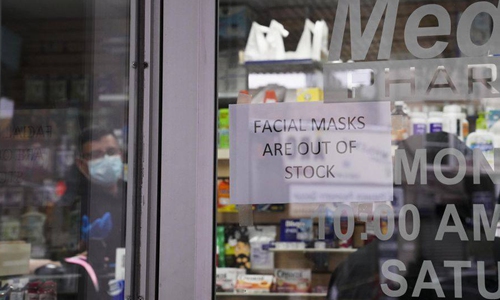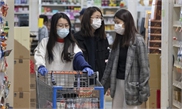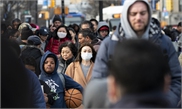Free market weakens US supply chain of much-needed medical supplies

A notice showing "facial masks are out of stock" is seen on a door of a pharmacy in New York, the US, February 29, 2020. Photo: Xinhua
A few days ago, a picture of three nurses from New York's Mount Sinai Hospital attracted broad attention around the world. In the picture, which apparently was taken in the hospital's hallway, the nurses put plastic trash bags over their surgical gowns. A Facebook post came with this caption in all caps: "NO MORE GOWNS IN THE WHOLE HOSPITAL Mount Sinai West, NO MORE MASKS AND REUSING THE DISPOSABLE ONES...NURSES FIGURING IT OUT DURING COVID-19 CRISIS."
The hospital denied that it hadn't provided protective gear to its medical workers and blamed the media for sensationalizing the story. Yet it is an undeniable fact that since the pandemic began, there have been medical supply shortages in US hospitals nationwide.
According to a national survey of 1,140 medical professionals conducted between March 23 and 25 by the Association for Professionals in Infection Control and Epidemiology based in Arlington, VA, just over 20 percent of respondents said their facility had none of the highly-efficient N95 respirator masks and almost 28 percent said they would soon run out. Nearly half said they don't have enough face shields and almost 13 percent said there were no face shields left in their facility. Nearly one-third of the respondents said they had run out of the simpler surgical masks or were about to. And one-quarter said they were even running out of hand sanitizer.
In the light of these challenges, the US Centers for Disease Control and Prevention in mid-March updated its strategies for optimizing the supply of face masks advising local public health officials to, among other things, make masks from bandanas and scarves if proper face masks are no longer available.
It's not a surprise that this tsunami-style pandemic has left the US, which usually has an abundant supply of any product, in such a dire situation. The Strategic National Stockpile, which was established in the late 1990s, is supposed to be able to provide supplies to local governments during crises like terrorist attacks, natural disasters and epidemics. But after it distributed many millions of N95 respirator masks and surgical masks, gloves and gowns during the 2009 N1H1 flu, the depleted stock has never been completely refilled.
By early March, the stockpile had about 12 million N95 respirator masks and 30 million surgical masks. This was when California, an early epicenter of the novel coronavirus infection, was requesting 20 million N95 masks.
But fingers can also be pointed at the so-called invisible hand of the free market. Letting the market make decisions without much guidance from the government has been the core of American capitalism and the conservative right-wing ethos that says all governments are bad and inept.
America's elite may have prospered with this thinking, but during a crisis like this when the entire nation is trying to save lives and end the threat the virus poses, the absence of government leadership and central control has become a hindrance.
On March 18, US President Donald Trump signed an executive order to invoke the Defense Production Act, a law passed in the 1950s that allows a president to force private companies to produce supplies in times of crisis. Trump didn't use the authority the law bestowed upon him for nine days, when he ordered General Motors to manufacture ventilators on March 27.
At a press conference on March 22, Trump explained his reluctance. "The fact that I signed it, it's in effect," he said. "But you know, we're a country not based on nationalizing our business. Call a person over in Venezuela, ask them how did nationalization of their businesses work out? Not too well."
To be sure, the American private sector is quite reliable in times like this. In New York and around the country, apparel manufacturers and heavy industry companies were already rolling up their sleeves and changing their production lines to produce goods the country needs badly. But the inherent flaws of the free market have also reduced the effects of these compassionate good deeds. When local governments have to go to the free market to shop for critical medical supplies, they compete against each other and against the federal government, driving up prices and making sellers very happy.
New York Governor Andrew Cuomo said that N95 masks that used to sell for 85 cents each are now costing $7, and a life-saving ventilator that used to cost $20,000 now carries a $50,000 price tag. And that is, "if you can find them," he told a news conference.
The mentality that places ideology above all other considerations is still quite popular in today's world, if not more so. And this often blinds us to the advantages of different systems and costs us an opportunity to learn from them. In normal times, the world may be able to afford such rigidity, but not during a pandemic when governments need to be nimble, forceful and creative.
Indeed, when we doff the tainted glasses of ideology, we can see that marshaling a country's economic and industrial resources to achieve a common goal is as essential as the temporary shelter-in-place policy that many of us are now abiding by. In an abnormal era, this is what we call the new normal.
The author is a New York-based journalist and Alicia Patterson fellow. rong_xiaoqing@hotmail.com


